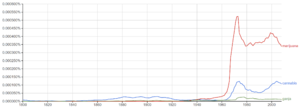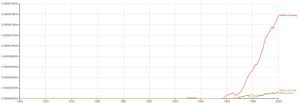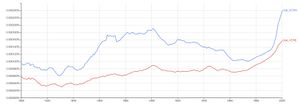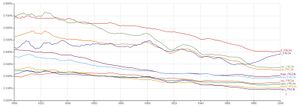COGS200/2017W1/NGramAssignment/Group33/Lukas
Compare words
(a)
Code: Cannabis, Marijuana, Ganja (b) This graph shows how often the phrases "Cannabis", "Marijuana" and "Ganja" have occurred in a corpus of books of the English language over the course of 200 years (1800 - 2000). (c) There is a suspicious peak in the graph of all phrase between 1965 and 1975 and especially the phrase "Cannabis" has a very high peak in around the year 1971. (d) The high use of these phrases correlates with the phenomena that Reggae got very popular in the 1970s. One of the most famous cofounders of this genre is Bob Marley with his Band The Wailers. This band got very popular on the global stage at the very same time. Reggae is very connected with the consumption of Cannabis and the object of a lot of songs from this time.
Wildcard search
(a)
Code: favorite season is * (b) This graph shows how often the phrase "favorite season is" was used with the phrases spring, autumn, fall and the in a corpus of books of the English language over the course of 200 years (1800 - 2000). (c) This code shows that the favorite season in the 1920s was autumn. (d)There are a number of reasons to explain the phenomena. As women in the US got the right to vote women got empowerment. So they entered the economy development and increased their consumption power. Together with the economic growth of the 'Golden 1920s' women started to spend their budget in fashion, which lead to the rise of the fashion industry. Also the protection of the domestic manufactoring markets provoked an increase in that industry. The leading fashion trends were tailored towards the season autum in that time which lead to this shown peak in the graph.
Inflection search
(a)
Code: What a fuck_INF (b) This graph shows how often the phrase "What a fuck" was used with a certain ending in a corpus of books of the English language over the course of 200 years (1800 - 2000). (c) There is a strong increase in the use of the phrase "What a fucking" starting in the 1960s. (d) While using a phrase with very strong language the graph shows a very interesting finding: Starting in the 1950s / 1960s the society started to become more liberal and informal and with that also the language. So the phrase "fucking" in front of an adjective in order to describe something is very common today in the use of strong language.
Search for a word using Part-of-Speech tags
(a)
Code: chat_NOUN, chat_VERB (b) This graph shows how often the phrase "chat" was used as a verb and as a noun in a corpus of books of the English language over the course of 200 years (1800 - 2000). (c) The graphs diverge strongly from each other starting in the year 1994. (d) Due to the technological progress communication changed in a lot of ways and alternatives to the telephone arised. One of these alternatives was the chatroom, mostly known as "chat". So the noun became more commen than the verb.
Search for Parts of Speech (not a specific word)
(a)
Code: *_PRON (b) This graph shows how often pronouns were used in a corpus of books of the English language over the course of 200 years (1800 - 2000). (c) The graphs of the phrase "I" rised conspicuously from the 1980s. (d) With the upcoming of the Self-Improve-Movement in the 1980s people started to focus more on themselfs and this phrase was more used.




